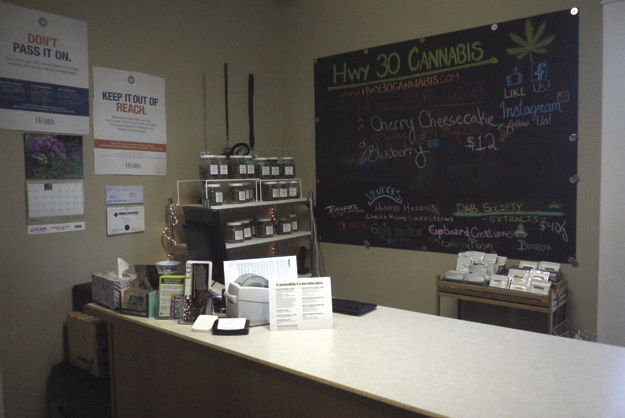Is La Grande missing out?
Published 7:30 am Sunday, July 10, 2016

- Is La Grande missing out?
Rona Lindsey said turning away customers deeply troubles her. Of course, part of that is the business owner in her. But as a former administrator at the Union County Chamber of Commerce, viewing tail lights as car after car heads right back to Interstate 84 is tough to watch.
“It tears me in two,” the Hwy 30 Cannabis owner said.
And it’s a scene she said unfolds daily, with increasing regularity since January, when the recreational sale of marijuana became legal in Oregon — but not in
La Grande.
Visitors from around the region enter the store, inquiring about what to do in the area. Before the conversation gets too deep, however, Lindsey has to ask one pressing question: “Are you a medical patient?”
Some are, but plenty are not. Depending on where they are from in Oregon or Washington, for some customers buying marijuana is like buying a six-pack.
“So you have to educate them on what the city did with the opt-out,” Lindsey said.
Patrons’ reactions are similar, Lindsey said: a mix of shock and incredulity that recreational marijuana sales are banned in La Grande.
All she can do is nod her head and tell the visitors about activities to do in Union County, hoping they’ll stick around and spend some money. But she said she’s aware they probably won’t.
“Now they have to stop in Huntington, or Hood River. Those are the closest (recreational dispensaries),” she said. “Or they go to Walla Walla, (Washington) and take chances on driving back across the state line. Why are we making people criminals when it’s legal?”
It’s the reason Lindsey is starting a La Grande voter initiative for the November’s election, of which she is awaiting review by the city’s attorney, that would allow recreational sales itn the city. She has to collect over 900 signatures from registered voters by Aug. 10, and she’s organizing a signing and educational event at the end of the month.
Huntington success
Lindsey hopes experiences in other cities such as Huntington, about 90 miles southeast of La Grande, show the fruits of recreational sales.
Of those cities with recreational marijuana sales closest to La Grande, Huntington has one of the most recent openings: 420Ville, a medical marijuana dispensary that began selling for recreational use in February.
When Chuck Guerri was a city councilor for Huntington, he voted against allowing recreational marijuana sales during a November 2015 meeting. Despite his vote, the council approved the application.
Now the mayor of the town of 440, Guerri still isn’t an advocate for recreational use.
“I think the medical (aspect) has some validity, and it looks like it has some issues where it helps,” he said. “But I’m not a fan (of recreational).”
What he is a fan of, however, is more revenue for his town. With the success of 420Ville, his stance, while not completely swinging 180 degrees, has softened.
“Local businesses have benefitted,” Guerri said. “The restaurant has increased business, the convenience and the fuel — they don’t give me percentages, but most businesses (in town) have received some benefit.”
And that’s before getting into potential tax revenue for Huntington. Oregon law stipulates that recreational marijuana sales be taxed at 25 percent. The tax on recreational pot eventually will be replaced with a levy ranging from 17 percent to 20 percent, once the Oregon Liquor Control Commission begins regulating recreational marijuana sales later this year. The Legislature set the base tax rate at 17 percent, but cities and counties can adopt ordinances that add up to an additional 3 percent.
Huntington City Recorder Tracy McCue said the city still has to have a resolution on the November ballot for voter approval, so it hasn’t collected any tax revenue yet.
To better inform voters, McCue recently requested some figures on what the city would’ve gained from 420Ville since recreational sales began in mid-February.
“From Feb. 17 to May 1, if we were drawing it in, we would’ve collected $9,000 on that 3 percent,” McCue said, adding that’s very significant for a town Huntington’s size.
Scott Matthews, the owner of 420Ville, did stipulate that a great deal of his business is medical. But regarding recreational pot, he said, sales have increased substantially every month.
“Our projected numbers are getting blown out of the water. We see some Fridays and Saturdays where 300 people come through here,” Matthews said. “We’re probably averaging 170 to 200 people every day.”
During the roughly half-year recreational sales have been allowed, Matthews said, he’s hired two local residents as full-time workers, with a couple others doing odd jobs and part-time work for 420Ville. Other than a parking issue with a neighboring landowner, there have not been any problems in the town, McCue, Guerri and Matthews each said.
McCue said she wasn’t a “pro vote” before, but she has, along with Guerri, modified her outlook.
“I don’t think anybody knew what to expect,” McCue said. “Now, we’re hearing about the potential revenue, and it’s like, ‘Wow.’ Some (residents) are a little more open now.”
While Huntington took that step, La Grande decided to hold off on recreational marijuana last year.
La Grande opt-out
After recreational marijuana was approved by Oregon voters in 2014 with Measure 91, recreational use was legalized July 1, 2015.
However, Gov. Kate Brown signed House Bill 3400, allowing cities and counties in which 55 percent or more of voters opposed Measure 91 to opt out of recreational sales.
In Union County, 59 percent of voters opposed Measure 91, which left the opt-out issue to each city. The La Grande City Council voted 5-1 to opt out last fall and discontinue discussion about the issue. La Grande Mayor Steve Clements was absent and did not vote on the issue. The absence was excused, however.
It was a move that still frustrates Lindsey. Among the many positives of selling recreational marijuana, she highlighted the tax dollars generated and jobs created by greenhouse grow operations. She also added, in a point that Guerri also echoed, that she believes alcohol causes more problems in families and communities than pot.
“People who use cannabis don’t go home and beat their kids, beat their wives or pull over (their car) because they can’t drive anymore,” Lindsey said.
Clements and City Councilor Gary Lillard were both for recreational sales in the past. Lillard said he’d like to see it voted on by the people of La Grande, and feels that legalized recreational sales won’t increase the use.
“I think if people that were already wanting to use it, they’re going to if it was legalized or not,” Lillard said. “People said all of a sudden we’d see all these negative things happen. In the relatively short time (use) has been legalized, I don’t think we’ve seen a drastic increase.”
Lindsey also said that a recreational ban allows the black market to sustain and/or thrive in Union County, and it creates grow operations in unregulated basements. Lindsey recalled hearing of growers with infestations of spider mites who bug-bombed the room, and sold the marijuana anyway.
“The pesticides they use, it says right on the bottle to cover your plants so they don’t die from this,” she said. “Who did he sell it to? People who can’t buy recreational, and people who sell it to kids.”
Making pot more accessible to juveniles is something that weighs on recreational opponents. Lindsey emphasized marijuana proponents don’t want that, either.
“The people who say, ‘Let’s think about the children,’ are not thinking about the children,” she said. “They’re thinking about their own morals and stigmas. If you talk to a pot smoker, they’ll say, ‘I don’t want kids to get it.’ They’ll fight tooth and nail for kids to not get it.”
Can La Grande be swayed?
Potential money was left on the table, Lindsey said, citing the exceeded expectations of revenue statewide. Economists initially predicted $2 to $3 million revenue in statewide recreational sales for 2016. But Oregon collected $10.5 million in the first three months of 2016, and about $3.5 million in the first month alone.
The sales boom surprised Clements. He said despite the council’s move last fall, a change of heart could set the wheels in motion for recreational sales in order to get that revenue. Cities and counties that reject recreational sales don’t get a share of the statewide tax revenue.
“It’s fair to say that the council could take up the issue, either the seated council or the next council,” Clements said. “If by some miraculous event, the council decided that it wanted to (take) some action, it could. I don’t think it would happen overnight, because we still have a process (and) have to draft ordinances and guidelines.”
But Clements was clear that the council does not want to waste time in official meetings discussing it currently. John Bozarth is one of the city councilors who voted against recreational sales, and the revenue doesn’t outweigh his beliefs.
“If we’ve got to rely on that type of revenue to keep our city going, let’s just close up the city, as far as I’m concerned,” said Bozarth, who is running for mayor in the fall. “I just don’t think we need that type of revenue to run our city.
“We have two medical marijuana facilities in our community (Hwy 30 and Eagle Cap Dispensary), and I think that’s enough. They serve the purpose for those people who need that for their pain.”
It’s tough to measure projections, for instance, comparing La Grande and Huntington. Matthews, of 420Ville, said plenty of his clients hop across the border from Idaho, which La Grande would not see as much of, unless a visitor had other reasons to be in town. It is difficult to accurately estimate how much revenue a business could collect. But, taking that $9,000 Huntington would have received in the first couple of months and comparing it to a population base the size of La Grande and Union County, plus Wallowa County, brings to mind much larger figures.
Clements said the revenue figures seem enticing, but may not make much of a dent in the city’s overall budget, based on a high estimated example.
“We just did a budget, with ($12.12 million) for general fund. That means we have to raise that to continue to provide our city services,” Clements said. “Let’s say tax revenue was $100,000 if we had recreational. That makes very little difference to (the general fund).”
While he voted for it, Clements does agree with Bozarth, in a way, that the revenue doesn’t offset the council’s decision. In the end, it comes down to what each community wants.
“Every community needs to make it’s own choice. (The city council) has made its choice,” Clements said. “If there’s a community sentiment that says we don’t want this, even for something like $100,000, I would have a hard time justifying this.”
He did say that La Grande’s rural community has long held prejudice against marijuana that may make it hard for an abrupt change of heart, but people’s opinions could soften over time as more and more communities reap benefits.
“Give it 10 or 15 years,” Clements said.
But that’s not soon enough for Lindsey. Her hope is that, sooner rather than later, success stories of recreational pot can change the community tide.
“It’s resistance to change, resistance against forward thinking,” she said. “Until the makeup of our city council changes, it’s going to be that same stagnant thinking. They don’t want La Grande to change.
“(But) educated people know the facts and know which way this is going. It’s a matter of time.”
Lindsey said if the initiative was passed with a majority, it would override the council’s ruling on the matter.





